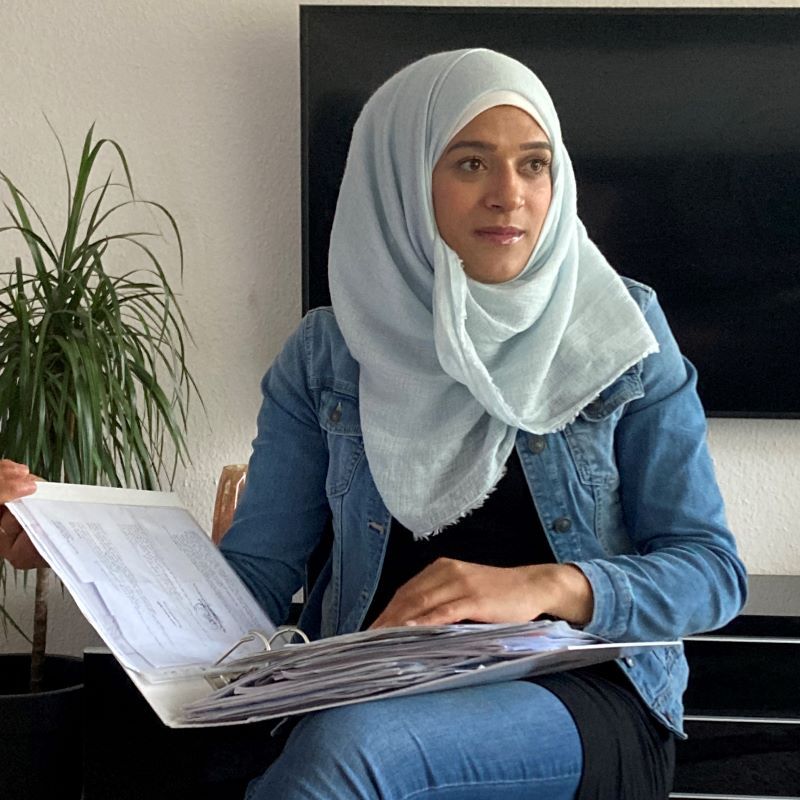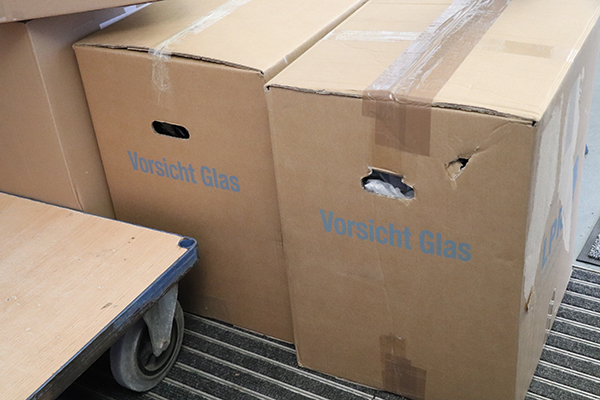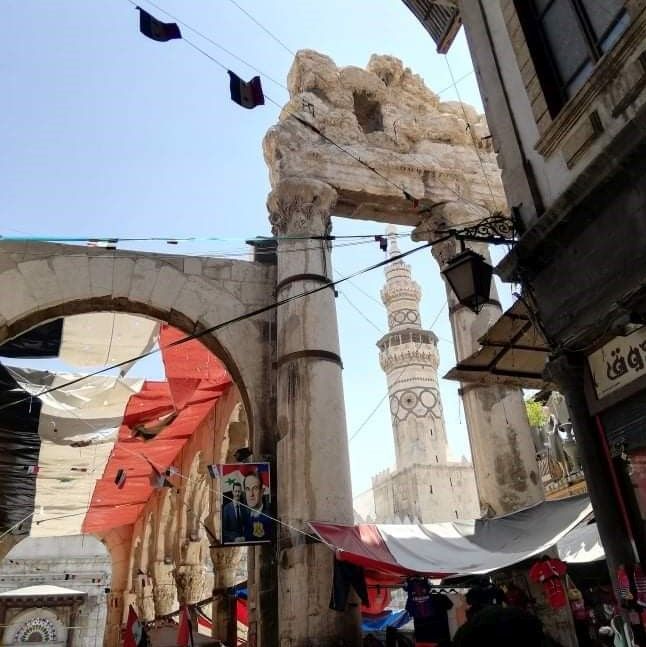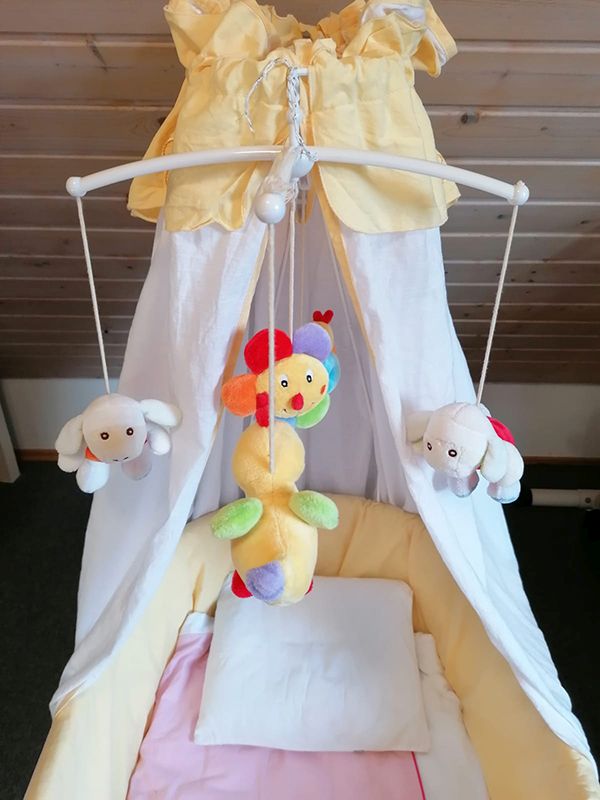By Ute Kaiser
Lobna Alhindi has a goal. The 36-year-old Syrian wants to work in a qualified profession. And: “I want to be on the safe side, with a certificate in my hand.”
But she has to overcome high hurdles to achieve this. The German authorities only partially recognise her school-leaving certificate and her studies in Syria. The responsible regional council in Stuttgart certified her as having the “level of an intermediate educational qualification” in 2019. This level corresponds to the Realschulabschluss or the Fachschulreife. With this, she could start an apprenticeship. She was “very disappointed” by this decision. The recognition counsellor of In Via at the Tübingen district office had assessed Lobna Alhindi’s chances of a higher classification as better.
The former assistant teacher in Al-Tabqa would now like to become a nursery school teacher. That’s why she had herself put on the waiting list for an internship at the Am Alten Ämmerle Children’s and Family Centre in Altingen. Her three-year-old twins Tala and Taim go to kindergarten there. The “positive experiences” and the concept of director Simone Schwarzach motivated Lobna Alhindi to choose this career path. She enjoys working with people and being socially involved. She did that pretty quickly after arriving in Germany and in Ammertal in 2015.
At the beginning, the former English student translated from Arabic into English for the Freundeskreis Asyl, among other things, and helped “a little”, as she says, in the clothing store. Because she has a positive approach to people, she knows many people in Ammerbuch and has made many friends. At first, the family lived in Entringen, but now they live in Altingen.
From 2017, Lobna Alhindi and a colleague organised and moderated events for refugees for the newspaper tünews INTERNATIONAL in Ammerbuch. Then came the Corona pandemic. tünews became an online medium. Meanwhile, Lobna Alhindi has a mini-job as a translator at tünews.
“It is not good for Germany if we just sit at home or do a mini-job.” That’s how she explains why she wants to get an apprenticeship. That is also important for her children, she says. She is sure: Her eleven-year-old son Hamza would be “proud” if not only the father worked, but also the mother.
It was not easy for her husband Basheer to find a job either. Despite his five-year training as a car mechanic in Syria, he cannot get a job in his profession in Germany. There are no computer diagnoses in Syria. He now works as a driver for a parcel delivery service. From many conversations with refugees about career plans and job prospects, Lobna Alhindi knows: “The problem doesn’t just affect us” – but many. She would therefore like the German state to be “more flexible” in the interest of all those affected and to make it “easier for well-educated people” to have their qualifications recognised. They are motivated and want to use their knowledge and skills in the world of work.
Lobna Alhindi is not discouraged – even though a counsellor at the employment agency did not give her much hope: after training as a nursery school teacher, she would have fewer chances of finding a job at the age of 40 than much younger applicants. As a mother of three children, she herself “gives a lot of thought” to whether and how a long-term training with family and household would be possible.
She therefore wants to clarify in a conversation at the Mathilde Weber School (MWS) in Tübingen whether parts of her training in Syria can possibly be recognised. At the MWS, there are three training paths for educators. They last between three and four years.
Lobna Alhindi’s next step into the world of work is to brush up on her German. “My language has deteriorated since Corona,” she regrets. Because of the pandemic, she had fewer contacts with Germans than before.
Info: In Via advises on foreign school and vocational qualifications at the Tübingen District Office: https://invia-drs.de/gemeinsam-perspektiven-entwickeln/beratung-zu-auslaendischen-abschluessen
A folder full of documents
Lobna Alhindi has collected many documents in a folder. In it is the certificate from the Syrian Ministry of Education from 2003. The ministry certifies that she has passed the science branch of secondary school. In addition to Arabic and English, her subjects there included mathematics, physics and chemistry. In the folder, there is also the certificate from the “Middle Institute for the Training of Assistant Teachers” in Al-Riqa, Syria. In the diploma, the director of the institute and the Syrian Minister of Education, among others, confirm that the student graduated with “very good” grades in English in the academic year 2004/2005. Afterwards, Lobna Alhindi taught children up to grade 6 at a school in Al-Tabqa near Rakka for three years as an assistant teacher. But she cannot prove that. The school was bombed out, as was the Alhindi family home, she says. The search for documents is also impossible for another reason: Lobna Alhindi no longer has any contact with people in her former place of residence in Syria.
tun21081107
Lobna Alhindi hat die Dokumente ihrer Schul- und Studienzeit in einem Ordner abgeheftet. Nur ein Nachweis über drei Jahre als Assistenzlehrerin in Al-Tabqa fehlt. Es ist nicht möglich, ihn zu besorgen. Die Schule ist zerbombt und Lobna Alhindi hat keine Kontakte mehr zu Menschen dort. Foto: Ute Kaiser.




